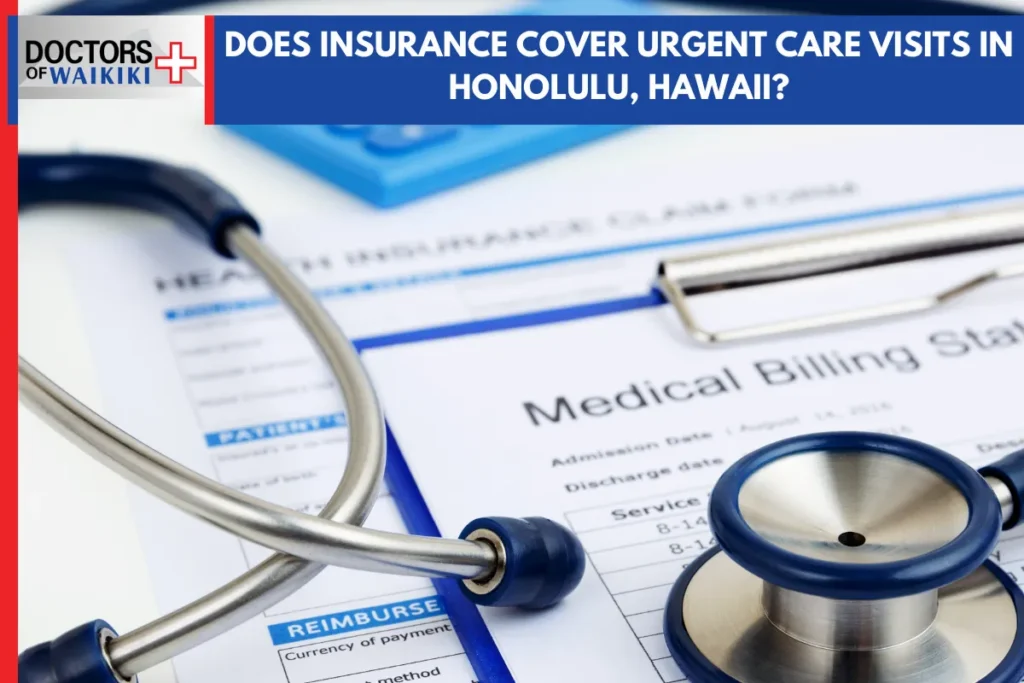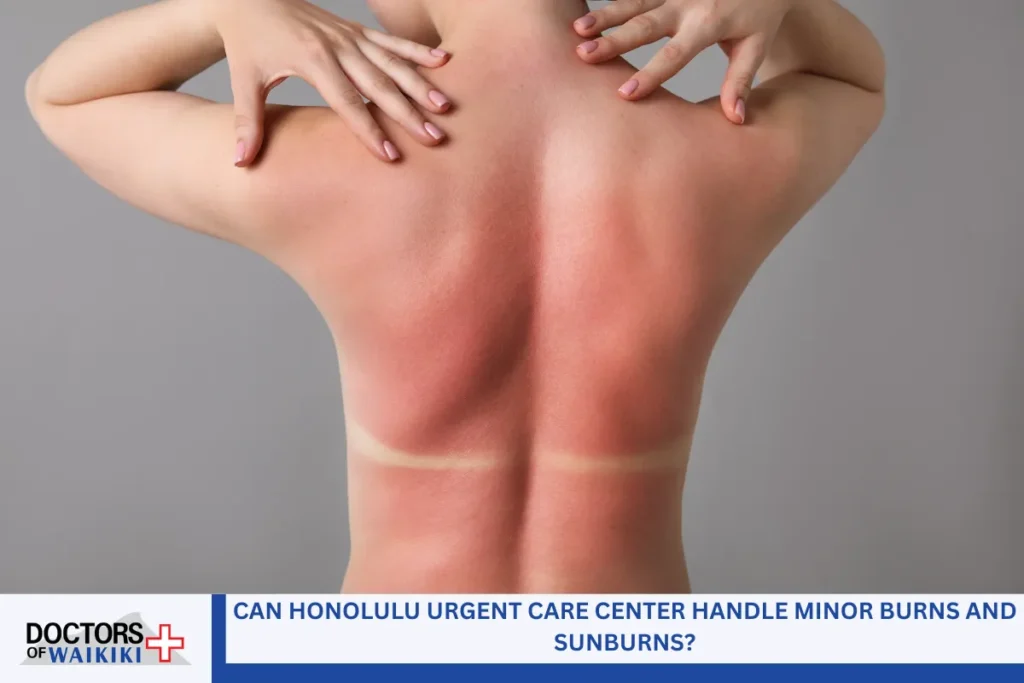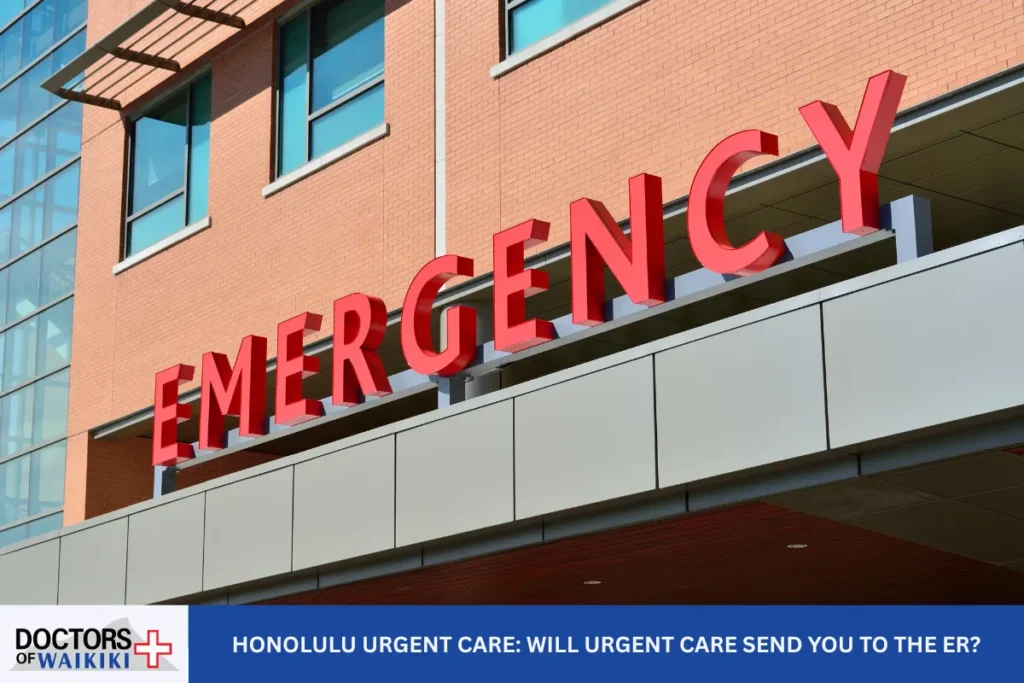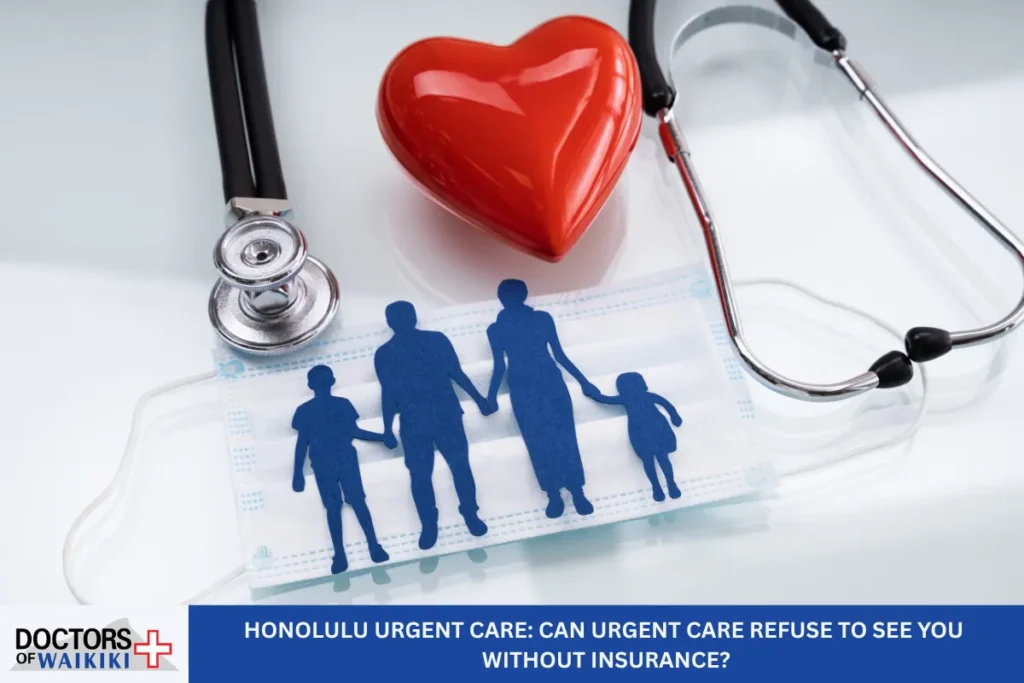When you’re not feeling well or have a minor injury, urgent care centers are a great option. They help you avoid the long waits and higher bills of the emergency room. But here’s the big question: Does insurance cover urgent care visits in Honolulu? The short answer is yes—most of the time. But there’s more to know to avoid surprise bills and make sure you’re covered.
Let’s break it down in a simple and helpful way so you can feel confident before walking into your next urgent care clinic in Hawaii.
Understanding Urgent Care: What Qualifies and When to Go

Urgent care centers are for health problems that aren’t life-threatening but still need attention fast. Think of them as the middle ground between your regular doctor and the emergency room.
You should go to urgent care for things like:
- Colds and flu symptoms
- Minor cuts and burns
- Ear infections
- Sprains and simple fractures
- Urinary tract infections (UTIs)
- Pink eye
- Mild asthma symptoms
Urgent care is walk-in friendly, meaning you don’t need an appointment. They’re usually open during evenings and weekends when your regular doctor’s office might be closed. In Honolulu, you’ll find many clinics that are open late and offer same-day care.
Does Insurance Pay for Urgent Care in Hawaii?

Yes, insurance usually covers urgent care visits—but how much it covers depends on your plan. If you have a health insurance plan through your job, the government, or a private company, you’ll likely have some urgent care benefits. That means you won’t have to pay the full amount out of pocket.
But here’s the catch: your insurance only covers the full benefits if the urgent care clinic is in your network. If it’s not, you could end up with a bigger bill.
Let’s say you have a PPO or HMO plan. These types often have different rules. A PPO may give you more choices, while an HMO usually requires you to stick with doctors in your network or medical group.
So yes—insurance covers urgent care, but double-check your plan before your visit so you know what to expect.
Average Cost of Urgent Care Visits With and Without Insurance

If you’re insured, your cost depends on your copay or coinsurance. A copay is a fixed amount you pay at check-in, like $25 or $50. Coinsurance means you pay a percentage of the cost after your deductible is met.
Here’s what most people pay:
- With Insurance:
- Copays range from $20 to $75
- Some plans require you to pay 10% to 30% of the bill after your deductible
- Copays range from $20 to $75
- Without Insurance:
- Most urgent care visits cost between $100 and $250
- Costs may rise if you need extra services like lab tests, x-rays, or stitches
- Most urgent care visits cost between $100 and $250
It’s always a good idea to ask the clinic about prices upfront—especially if you don’t have insurance or your deductible is still high.
Insurance Coverage for Urgent Care in Honolulu: What Local Plans Say

In Honolulu, most local health insurance plans encourage urgent care over the emergency room for minor issues. It’s faster and more affordable.
Here’s what to expect from local insurers:
- HMSA: Covers urgent care with a copay if you use a provider in your network.
- Kaiser Permanente: Offers walk-in care at their urgent care centers. Members may pay a set copay.
- UHA Health: Recommends urgent care and covers visits for common minor illnesses and injuries.
- Adventist Health Castle and other clinics: Accept a variety of insurance plans, but call ahead to confirm yours is included.
Remember: each plan is different. Some need a referral, some don’t. Some cover more, some less. Always call your insurance or check their website before heading in.
What Affects Whether Insurance Will Cover Your Visit

Your insurance might not cover 100% of your urgent care visit. Here’s why:
- Is the clinic in-network?
- In-network providers have a deal with your insurance company to keep costs low.
- Out-of-network clinics can charge you more—and your insurance may not help much.
- In-network providers have a deal with your insurance company to keep costs low.
- Did you meet your deductible?
- If you haven’t paid enough in healthcare costs yet this year, you might pay more out-of-pocket.
- If you haven’t paid enough in healthcare costs yet this year, you might pay more out-of-pocket.
- Copay vs. Coinsurance:
- Some plans charge a flat fee, others a percentage of the cost. Know your plan details.
- Some plans charge a flat fee, others a percentage of the cost. Know your plan details.
- Reason for the visit:
- If you go for something your plan doesn’t count as “medically necessary,” you might not get full coverage.
- If you go for something your plan doesn’t count as “medically necessary,” you might not get full coverage.
- HMO vs. PPO rules:
- HMO plans often require you to stick with your assigned medical group. Some people on Reddit found out the hard way that going to the “wrong” clinic—even if it took their insurance—meant no coverage.
- HMO plans often require you to stick with your assigned medical group. Some people on Reddit found out the hard way that going to the “wrong” clinic—even if it took their insurance—meant no coverage.
So, always check before you go.
How to Confirm Coverage Before Your Visit

Before you walk into an urgent care clinic, it’s smart to make sure your insurance will help cover the cost. Luckily, checking is easy and only takes a few minutes.
Here’s what you can do:
- Check your insurance app or website: Most health plans have a tool to search for in-network urgent care centers near you.
- Call your insurance company: Ask them if the clinic you’re planning to visit is covered under your plan.
- Ask the urgent care front desk: They can often tell you right away which insurance plans they accept.
- Look for plan documents: Your summary of benefits will list your copay, deductible, and any urgent care rules.
Also, keep in mind that some services—like physicals for sports or work, or travel vaccines—might not be covered because they aren’t considered “medically necessary.”
Making a quick call ahead of time can help you avoid billing surprises later.
Tips to Avoid Surprise Bills in Honolulu Urgent Care Clinics

Even with insurance, people sometimes get caught off guard by unexpected bills. Don’t let that happen to you. Here are a few helpful tips to stay in control of your costs:
✅ Always ask if the clinic is in-network. Just because they “accept your insurance” doesn’t mean they’re contracted with your plan.
✅ Know your copay and deductible. Even if you’re covered, you might have to pay more if you haven’t hit your deductible yet.
✅ Request an itemized bill. This helps you understand what you’re paying for and lets you spot any mistakes.
✅ Ask about self-pay rates. If you don’t have insurance or prefer not to use it, many urgent care centers offer discounted cash rates.
✅ Avoid ER unless it’s a real emergency. Many insurance plans charge more for emergency room visits—even if it’s for a minor issue.
Online communities like Reddit and Quora are full of stories about people who were surprised by bills—even when the clinic said they accepted their insurance. Often, the problem came down to medical groups or billing departments being out-of-network.
So, don’t be afraid to ask a lot of questions. It’s your health—and your money!
What You Should Know Before Your Next Visit

If you’re in Honolulu and need quick care for something that’s not an emergency, urgent care is a smart choice. It’s faster than the ER, less expensive, and often more convenient than waiting for a primary care appointment.
The good news? Most insurance plans do cover urgent care visits. But the key is knowing how your specific plan works. Always check if the clinic is in-network, understand what your copay and deductible are, and ask about costs up front.
By taking a few easy steps before your visit, you can get the care you need—without worrying about a big, unexpected bill later.
Urgent care is here to help when you need it most. And with the right info in your pocket, you’ll walk in feeling ready, not stressed.
Honolulu Urgent Care – Doctors of Waikiki

Looking for fast, friendly, and affordable urgent care in Honolulu? Come see us at Doctors of Waikiki—your trusted walk-in clinic right in the heart of Waikiki. Whether it’s a sudden fever, sprain, or minor injury, we’re here to help you feel better without the long ER wait or sky-high bills. Most major insurance plans are accepted, and we’ll help you understand your coverage every step of the way.
Our experienced team provides quick care for non-emergency issues, from coughs and cuts to travel health and minor infections. No appointment needed—just walk in, get seen, and get back to enjoying your day. Locals and visitors are welcome!
Skip the hassle, skip the high costs. Call us today at (808) 922-2112 or stop by our clinic for fast, professional, and compassionate Honolulu urgent care. We’re here when you need us—day, night, or weekend.
Frequently Asked Questions About Urgent Care in Honolulu
Is urgent care covered by HMSA or Kaiser in Hawaii?
Yes, HMSA (Hawaii Medical Service Association) and Kaiser Permanente both cover urgent care visits in Hawaii, including on Oʻahu and neighbor islands like Hawaiʻi Island. Coverage varies depending on the specific plan, but generally, non-life-threatening conditions such as sore throats, sinus infections, sprains, and minor cuts are included in urgent care benefits.
For HMSA members, urgent care services are typically covered if you go to an in-network provider. Most urgent care centers in Honolulu work with HMSA, but it’s still important to check your insurance card, plan documents, or online directory. Copays for urgent care visits usually range from $25 to $75. If you haven’t met your deductible, you may need to pay more at the time of service.
Kaiser Permanente Hawaii operates its own urgent care clinics with extended hours and offers access to nurse practitioners, physician assistants, and other health care professionals. As long as you’re a Kaiser member and visit a Kaiser facility, your urgent care visit is generally covered with a low copay.
Always verify network coverage before your visit. If the clinic is out-of-network or not part of your medical group, you may face additional costs. Understanding your plan benefits helps you make informed decisions and avoid unexpected medical bills.
Do I need pre-approval to visit urgent care?
In most cases, you do not need pre-approval or a referral from your primary care physician to visit an urgent care center in Honolulu. Urgent care facilities are designed to provide prompt attention to non-emergency conditions without the delays associated with primary care doctors or emergency care facilities.
However, some insurance plans, especially HMO (Health Maintenance Organization) types, may have specific rules. For example:
- You may need to select a primary care provider and stay within a medical group.
- If you visit an urgent care provider outside of your network or group, your visit may not be fully covered.
- Pre-authorization may be required for complex treatments or diagnostic services.
It’s always smart to double-check your health insurance policy. You can do this by calling the customer service number on your insurance card or logging into your online member portal. Ask specifically:
- Is pre-authorization required for urgent care?
- Which urgent care providers are considered in-network?
When you’re dealing with a medical condition like a sinus infection, strep throat, or minor allergic reaction, getting fast care without red tape is crucial. Fortunately, most affordable health insurance plans allow you to walk into an urgent care clinic with no prior approval—especially for common illnesses and non-life-threatening injuries.
Will I pay more if I go to urgent care on the weekend or after hours?
No, urgent care costs are generally the same, whether you go during regular office hours or on the weekend or evening. One of the best things about urgent care facilities is their extended hours, making them a convenient option when your primary care doctor is unavailable.
That said, there are a few things to consider that could affect the final cost:
- Copays and Coinsurance: Your insurance company might charge a flat urgent care visit cost—say $40—regardless of when you go.
- Services Provided: If your visit includes diagnostic equipment like X-rays or bloodwork, or if you need additional services, that can increase your pocket costs.
- Out-of-Network Facilities: If you visit a clinic that’s out of your network coverage, your insurance provider may not cover as much of the bill, leading to higher out-of-pocket expenses.
It’s a good idea to review your plan’s explanation of benefits (EOB) or speak with a health care professional in advance. Clinics typically don’t charge more based on time, but insurance coverage can differ depending on the provider and location.
To avoid surprises, bring your insurance card, ask for a breakdown of actual costs, and request a payment estimate if you’re unsure. Whether it’s Saturday afternoon or Tuesday night, non-life-threatening health issues like a sinus infection or sore throat shouldn’t mean financial stress.
What if the urgent care accepts my insurance but not my medical group?
This is a common source of confusion for patients in Hawaii. Some urgent care providers may accept your insurance overall but not your specific medical group—especially if you have an HMO plan or are part of a healthcare network like Kaiser or HMSA Advantage.
Here’s how it works:
- Insurance Acceptance means the clinic can bill your insurance company.
- Medical Group Affiliation refers to whether the clinic is contracted with your specific network of doctors.
If you go to a clinic that accepts your health insurance company but isn’t contracted with your medical group, your visit may be considered out-of-network or not authorized, leading to denied claims or higher urgent care billing costs.
To avoid this:
- Check your insurance directory for in-network urgent care centers that belong to your medical group.
- Call your insurer and ask: “Does this clinic fall under my assigned medical group?”
- Ask the urgent care clinic if they’re contracted with your plan and medical group.
Choosing a provider outside your group can lead to unexpected medical bills even if the clinic is listed as accepting your insurance. Always verify both before seeking non-emergency care, especially for basic medical services like flu shots, eye infections, or strep tests.
Can tourists use urgent care in Honolulu with travel insurance?
Yes, tourists can use urgent care services in Honolulu, and many travel insurance plans will help cover the cost of care for non-life-threatening medical conditions. Whether you’re visiting from the mainland or overseas, urgent care is a smart option for sudden illnesses like sore throat, sinus infections, minor injuries, or allergic reactions.
Here’s what you should know:
- Bring your insurance documents. This includes your travel insurance card, policy number, and contact information for your provider.
- Call ahead. Ask the urgent care clinic if they accept your travel insurance or can help you submit a claim.
- Be ready to pay upfront. Some urgent care centers may require payment at the time of service, and you’ll file a reimbursement claim later with your insurance.
If your travel plan includes emergency medical coverage, check the fine print. It usually covers medical attention for acute illnesses, but not elective or pre-existing conditions unless specified. Be sure to understand the extent of coverage, including exclusions, before your visit.
Urgent care in Hawaii offers shorter wait times, professional staff, and access to diagnostic services—making it a convenient option for travelers who need basic healthcare during their stay.
What if I don’t have insurance? Can I still go to urgent care?
Yes, you can still visit urgent care without insurance in Honolulu or anywhere in Hawaii. Urgent care centers welcome uninsured patients and often offer transparent pricing, discounted rates, or payment plans to make medical services more accessible.
Here’s how to prepare:
- Ask about the self-pay rate. Most clinics have a set fee for a basic visit, typically ranging from $100 to $250.
- Get a breakdown of services. If you need extra care—like X-rays, lab work, or wound treatment—these may add to your total cost of care.
- Request a payment plan. Some facilities allow monthly installments, helping to reduce the financial burden.
Urgent care is often more affordable than emergency care, making it a good choice for non-life-threatening injuries like minor burns, cuts, or flu symptoms. The staff can treat a wide range of common conditions using professional diagnostic equipment without the cost of a hospital.
Even without medical insurance, you’ll receive prompt attention and quality medical intervention from licensed healthcare providers. Just be upfront about your insurance status, ask for an estimate, and explore all options available to you as a cash-pay patient.
Does urgent care count toward my deductible?
Yes, in most cases, your urgent care visit does count toward your annual deductible, depending on your insurance policy. This is especially true if your plan includes urgent care as part of its covered medical services. Here’s how it works:
- If you haven’t met your deductible: You’ll likely pay the full actual cost of the visit until your deductible is satisfied.
- If your deductible has been met: Your insurance starts to share the cost through coinsurance, and you’ll pay only a portion or a flat copay.
Check your explanation of benefits (EOB) or speak with your health insurance company to confirm what counts. Be sure to ask:
- Is urgent care included in my deductible requirements?
- What’s the cost if I haven’t reached it yet?
- Are all services during my visit (e.g., labs, X-rays) applied to the deductible?
Keep your receipts and billing information in case you need to submit documentation. Also, remember that out-of-network urgent care visits might not count toward your deductible unless your plan specifically allows it.
So, if you visit an urgent care provider for a non-life-threatening health issue, rest assured that it usually helps move you closer to reaching your deductible threshold, giving you access to better plan benefits for future care.
Read Urgent Care vs Emergency Room: What’s the Difference in Services and Pricing?





